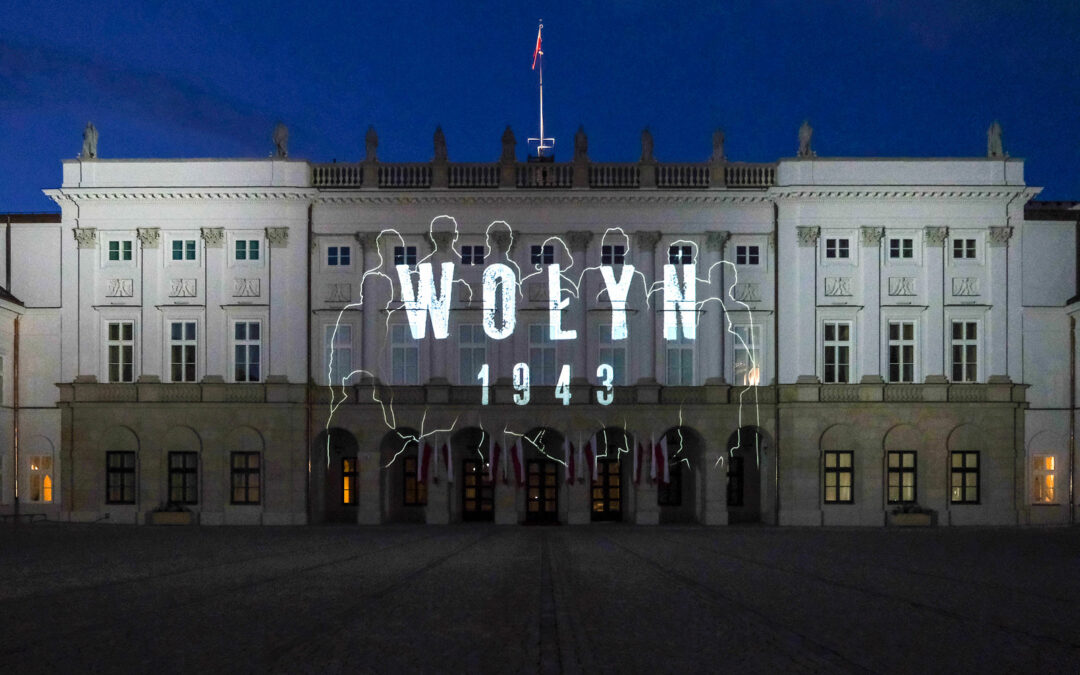Keep our news free from ads and paywalls by making a donation to support our work!

Notes from Poland is run by a small editorial team and is published by an independent, non-profit foundation that is funded through donations from our readers. We cannot do what we do without your support.
Poland has announced that a decision has been made to allow the exhumation in Ukraine of victims of the World War Two Volhynia massacres, in which around 100,000 ethnic Polish civilians were killed by Ukrainian nationalists. The issue has long been a source of tension between the two neighbours and allies.
The announcement also comes a day after Ukraine strongly criticised the main opposition candidate in Poland’s presidential election for saying that he “does not envision” Ukraine joining the European Union or NATO until the issue of the massacres, including exhumations, is resolved.
Wreszcie przełom. Jest decyzja o pierwszych ekshumacjach polskich ofiar UPA. Dziękuję ministrom kultury Polski i Ukrainy za dobrą współpracę. Czekamy na kolejne decyzje.
— Donald Tusk (@donaldtusk) January 10, 2025
“Finally a breakthrough,” tweeted Polish Prime Minister Donald Tusk on Friday afternoon. “There is a decision on the first exhumations of Polish victims of the UPA [Ukrainian Insurgent Army]. I thank the ministers of culture of Poland and Ukraine for their good cooperation. We are waiting for further decisions.”
Later, Anna Ruszczyńska, an official at the Polish culture ministry, which is responsible for negotiations with Ukraine over exhumations, told the Polish Press Agency (PAP) that, due to the sensitive nature of the issue, details about the exhumations would only be released after they had been carried out.
Polish foreign ministry spokesman, Paweł Wroński, meanwhile, told PAP that the breakthrough was evidence that Poland’s “tough” position in pushing for exhumations had been “effective”.
In July last year, Polish deputy prime minister Władysław Kosiniak-Kamysz warned that Poland would not allow Ukraine to join the EU “if the Volhynia issue is not resolved”.
Earlier this week, Karol Nawrocki, who is standing in this May’s presidential election as the candidate supported by Law and Justice (PiS), the main conservative opposition party, had made similar remarks.
“Currently, I do not envision Ukraine in either the European Union or NATO until important civilisational issues for Poland are resolved,” he declared, referring to the Volhynia massacres, which Poland regards as a genocide. Ukraine rejects that label and honours some of the nationalist leaders as heroes.
“A country that is not able to account for a very brutal crime against 120,000 of its neighbours cannot be part of international alliances,” said Nawrocki.
That prompted an angry response from Ukraine’s foreign ministry, which accused Nawrocki of making “manipulative” and “unacceptable” claims that “contribute to the hostile efforts” by Russia to “destroy Ukrainian-Polish friendship and mutual understanding”.
Ukraine has condemned Polish presidential candidate Karol Nawrocki's remarks as "manipulative" and "unacceptable".
It says they "contribute to the hostile efforts" by Russia to "destroy Ukrainian-Polish friendship and mutual understanding" https://t.co/4TsL7tHrtg
— Notes from Poland 🇵🇱 (@notesfrompoland) January 9, 2025
Speaking to PAP today, Wroński, the foreign ministry spokesman, said that the decision on exhumations would be “good for Polish-Ukrainian relations and for Ukraine itself”.
“It is very important to create historical awareness and base it on truth,” he added. “This serves Ukraine as a European nation.”
In 2022, Poland’s Institute of National Remembrance (IPN) estimated that the remains of around 55,000 ethnic Polish victims and 10,000 Jewish ones “still lie in death pits in Volhynia, waiting to be found, exhumed and buried”.
However, since 2017, exhumations have been banned by Ukraine, a decision that was made after a monument to the UPA in Poland was dismantled, notes PAP.
A memorial to victims of the Volhynia massacres, in which ethnic Poles were killed by Ukrainian nationalists during WW2, has been unveiled in Poland.
Several cities refused to host the monument, which depicts a baby being impaled on a Ukrainian trident https://t.co/OyOvQlAWkg
— Notes from Poland 🇵🇱 (@notesfrompoland) July 15, 2024
Recent years have seen a number of conciliatory remarks between Poland and Ukraine regarding the Volhynia massacres and the exhumation of victims. However, they have been followed by little concrete progress.
In 2023, Poland’s then prime minister, Mateusz Morawiecki, said that Ukrainian President Volodymyr Zelensky had pledged that exhumations would take place. In October, Morawiecki’s government announced that a mass burial pit containing victims of the massacres had been found in Ukraine.
In an important symbolic moment, 2023 also saw Zelensky and his Polish counterpart, Andrzej Duda, jointly commemorate the 80th anniversary of the massacres. The speaker of Ukraine’s parliament, also “expressed sympathy” towards the victims and their families.
Last year, the Ukrainian Institute of National Memory (UINM) announced that it was planning to search for the remains of victims in response to requests from Polish citizens. In November, Ukraine and Poland released a joint statement announcing progress towards allowing exhumations to take place.
Poland will not allow Ukraine to join the EU until the issue of the Volhynia massacres in WWII is "resolved", says the Polish deputy PM
The massacres, in which Ukrainian nationalists killed ethnic Poles, have long caused tensions between the two countries https://t.co/cPEArLdvDL
— Notes from Poland 🇵🇱 (@notesfrompoland) July 24, 2024

Notes from Poland is run by a small editorial team and published by an independent, non-profit foundation that is funded through donations from our readers. We cannot do what we do without your support.
Main image credit: KPRP




















